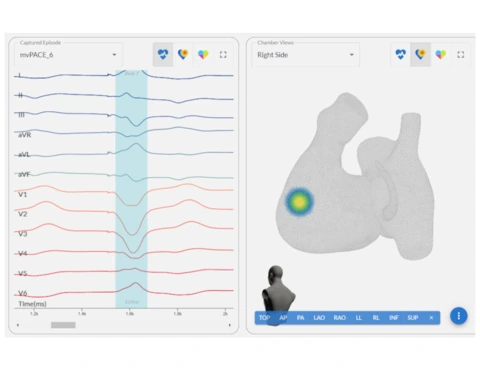
Heart Rhythm Case Reports Publishes First Use of AI-Guided ECG Mapping for Left Bundle Branch Area Pacing
Vektor Medical, a leader in non-invasive, AI-powered arrhythmia analysis technology, has announced the publication of a groundbreaking case report in Heart Rhythm Case Reports. The case, conducted by physicians from the University of California San Diego (UCSD), details the first successful use of AI-driven ECG mapping to guide left bundle branch area pacing (LBBAP) implantation. This innovative procedure highlights how vMap, an AI-powered mapping technology, significantly enhances procedural accuracy, safety, and efficiency during LBBAP lead positioning.
LBBAP has emerged as a preferred physiologic pacing technique due to its potential for improving patient outcomes. vMap’s non-invasive approach offers a transformative solution, as it reduces the need for traditional fluoroscopy and contrast agents—critical elements in minimizing patient risk during these complex procedures.
The case involved a 90-year-old male patient with advanced chronic kidney disease and a severe allergy to iodinated contrast agents. The patient underwent a dual-chamber LBBAP implantation, and vMap was used for peri-procedural guidance throughout the procedure. The implantation was successfully completed with reduced fluoroscopy time and without the need for contrast injection, helping to mitigate the risks typically associated with traditional pacing procedures.
Key Procedure Highlights:
- vMap provided real-time, AI-driven guidance to accurately position the pacing lead on the right ventricular (RV) septum.
- The AI technology compared the patient’s QRS morphology with a comprehensive digital reference library containing thousands of cardiac simulations of right ventricular pacing. This comparison enabled the precise localization of the lead within the heart.
- Successful lead placement was confirmed with left bundle capture, significantly reducing the reliance on traditional fluoroscopic imaging.
- vMap’s ability to analyze paced QRS morphology in real time enhanced the mapping efficiency, especially in cases where the optimal pacing site was not immediately identifiable.

The case report underscores vMap’s ability to transform cardiac pacing workflows while prioritizing patient safety. As the only FDA-cleared, non-invasive, AI-based solution for mapping arrhythmias and analyzing both atrial and ventricular pacing using a standard 12-lead ECG, vMap represents a significant advancement in the field of electrophysiology.
“This case marks the first time vMap has been utilized to guide LBBAP implantation. The positive procedural outcomes not only showcase vMap’s immediate benefits but also demonstrate its broader potential to improve cardiac care and advance a variety of cardiac interventions,” said Rob Krummen, CEO of Vektor Medical.
The use of vMap in this procedure exemplifies its ability to improve outcomes for patients who may be at higher risk due to medical conditions such as chronic kidney disease or allergies to contrast agents. By eliminating the need for contrast and reducing fluoroscopy exposure, vMap ensures a safer environment for both the patient and the physician, aligning with Vektor Medical’s mission to enhance patient care while optimizing procedural workflows.
Transforming Cardiac Pacing and Electrophysiology
The successful deployment of vMap in this first-of-its-kind LBBAP procedure demonstrates the transformative potential of AI in cardiac care. Traditional methods of positioning pacing leads, which often rely on fluoroscopy and contrast agents, can introduce significant risks, particularly for vulnerable populations. vMap’s ability to guide physicians with precision using non-invasive mapping technology reduces those risks while enhancing the accuracy and efficiency of the procedure.
As more cardiac interventions move toward precision medicine, the role of AI in electrophysiology is poised to grow. Vektor Medical’s vMap offers a scalable, effective solution that can be applied across a wide range of procedures, improving outcomes for patients with arrhythmias and other heart conditions.
About Vektor Medical
Headquartered in San Diego, Vektor Medical is a leader in the development of AI-powered arrhythmia analysis technology. Through its non-invasive arrhythmia mapping solution, vMap, the company aims to improve the efficiency of cardiac ablation procedures, enhance clinical outcomes, and optimize workflow for electrophysiologists. By leveraging AI, Vektor Medical helps clinicians achieve more accurate and effective results while reducing patient risks.




